
The City Law School will launch their new Evidence and Justice Forum (EJF) with a guest lecture by Michael Mansfield QC on February 22nd at 6.30pm.
Earthquakes, tsunamis, volcanic eruptions, hurricanes and floods show us the extreme and unpredictable power of Mother Nature. These events leave devastation in their wake both human and physical. We can monitor the earth, we can build barriers, and nations can sign climate change agreements but there is little we can do to protect ourselves.
Is it time now to move beyond goodwill? Is it time to invoke the law – an international law on Ecocide, the environmental equivalent of genocide? Is it legally possible?
In September 2011, at London’s Supreme Court, a Mock Trial played out as though this crime were already adopted by the UN. Michael Mansfield QC, the prosecuting barrister, and Nick Lickley QC, the defence barrister led the case for and against two fictional CEOs. The trial outcome was not pre-scripted; it was for the jury to declare whether or not the Earth’s Right to Life had been violated and if the crime of Ecocide was proven. This trial was one of the first steps in a sustained campaign to raise awareness of these issues and to air them within Government, business and communities. This lecture continues that momentum. In his lecture, Michael Mansfield will give evidence to support such a law and aim to set out the implications for businesses – regardless of whether they simply provide the funding for activities which impact the environment or are the main protagonists.
(Background: Polly Higgins, barrister and international environmental lawyer proposed to the UN in April 2010 the need for an international law on Ecocide.)
The objects of the EJF are the advancement of research (including facilitation of the supervision of research students), scholarship and education in the fields of evidence and justice within both criminal and civil jurisdictions. ‘Evidence and justice’ covers such subjects as the process of proof, accuracy in fact-determination, probability theory, adversarial, inquisitorial and alternative dispute resolution processes, pre-trial, trial and post-trial procedure, advocacy, the roles of judges, magistrates, jurors and witnesses, including expert witnesses, and the use of ‘special advocates’ in relation to secret evidence. It also covers non-legal disciplines that have a bearing on evidence and justice, including, for example, psychology and the forensic sciences.
Be sure to book online for this launch event.
